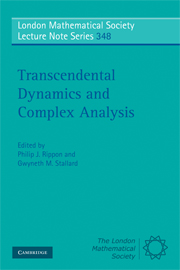Book contents
- Frontmatter
- Contents
- Preface
- Introduction
- 1 Iteration of inner functions and boundaries of components of the Fatou set
- 2 Conformal automorphisms of finitely connected regions
- 3 Meromorphic functions with two completely invariant domains
- 4 A family of matings between transcendental entire functions and a Fuchsian group
- 5 Singular perturbations of zn
- 6 Residual Julia sets of rational and transcendental functions
- 7 Bank-Laine functions via quasiconformal surgery
- 8 Generalisations of uniformly normal families
- 9 Entire functions with bounded Fatou components
- 10 On multiply connected wandering domains of entire functions
- 11 Fractal measures and ergodic theory of transcendental meromorphic functions
- 12 Combinatorics of bifurcations in exponential parameter space
- 13 Baker domains
- 14 Escaping points of the cosine family
- 15 Dimensions of Julia sets of transcendental meromorphic functions
- 16 Abel's functional equation and its role in the problem of croissance régulière
9 - Entire functions with bounded Fatou components
Published online by Cambridge University Press: 06 July 2010
- Frontmatter
- Contents
- Preface
- Introduction
- 1 Iteration of inner functions and boundaries of components of the Fatou set
- 2 Conformal automorphisms of finitely connected regions
- 3 Meromorphic functions with two completely invariant domains
- 4 A family of matings between transcendental entire functions and a Fuchsian group
- 5 Singular perturbations of zn
- 6 Residual Julia sets of rational and transcendental functions
- 7 Bank-Laine functions via quasiconformal surgery
- 8 Generalisations of uniformly normal families
- 9 Entire functions with bounded Fatou components
- 10 On multiply connected wandering domains of entire functions
- 11 Fractal measures and ergodic theory of transcendental meromorphic functions
- 12 Combinatorics of bifurcations in exponential parameter space
- 13 Baker domains
- 14 Escaping points of the cosine family
- 15 Dimensions of Julia sets of transcendental meromorphic functions
- 16 Abel's functional equation and its role in the problem of croissance régulière
Summary
Abstract. Starting with the work of I. N. Baker that appeared in 1981, many authors have studied the question of under what circumstances every component of the Fatou set of a transcendental entire function must be bounded. In particular, such functions have no domains now known as Baker domains, and no completely invariant domains. There may be wandering domains but not the familiar and more easily constructed un-bounded ones that often appear for functions defined by simple explicit formulas.
Two types of criteria are involved in the partial answers obtained for this question: the order of growth, and the regularity of the growth of the function.
Baker himself showed that a function of sufficiently slow growth has only bounded Fatou components and noted that order 1/2 minimal type is the best condition one could hope for. Subsequently his results have been extended to order less than 1/2 except for wandering domains, and also to wandering domains if the growth satisfies, in addition, a mild regularity condition. Similar results have been obtained also for certain functions of faster growth provided that the growth is sufficiently regular.
In this paper we review the results achieved and the methods involved in this area.
INTRODUCTION
Let f be a transcendental entire function. We consider the question, initiated by I.N. Baker in 1981, of under what circumstances all the components of the Fatou set of f are bounded.
- Type
- Chapter
- Information
- Transcendental Dynamics and Complex Analysis , pp. 187 - 216Publisher: Cambridge University PressPrint publication year: 2008
- 9
- Cited by

